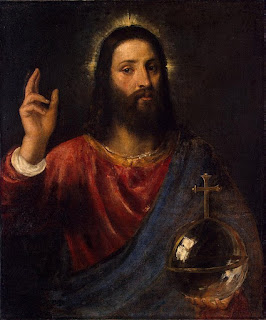 |
| Director Riccardo Favero |
The concert was sponsored by the Fondazione Ugo e Olga Levi (the Ugo and Olga Levi Foundation), the Fondazione Teatro La Fenice (the Foundation of La Fenice Theater) and Chorus - Associazione per le chiese del Patriarcato di Venezia (Chorus -- the Association for the Churches of the Patriarchy of Venice), together with the Regione del Veneto (the Veneto Region).
The program was Antonio Lotti's Miserere mei Deus and Crucifixus etiam pro nobis, together with Dietrich Buxtehude's Membra Iesu nostri patientis sanctissima.
From Wikipedia:
Antonio Lotti (ca. 1667 – 5 January 1740) was an Italian composer of classical music.Lotti was born in Venice, although his father Matteo was Kapellmeister at Hanover at the time.[1]
In 1682, Lotti began studying with Lodovico Fuga and Giovanni Legrenzi, both of whom were employed at St Mark's Basilica, Venice's principal church. Lotti made his career at St Mark's, first as an alto singer (from 1689), then as assistant to the second organist, then as second organist (from 1692), then (from 1704) as first organist, and finally (from 1736) as maestro di cappella, a position he held until his death.
He also wrote music for, and taught at, the Ospedale degli Incurabili. In 1717 he was given leave to go to Dresden, where a number of his operas were produced, including Giove in Argo, Teofane and Li quattro elementi (all with librettos by Antonio Maria Luchini).[2] He returned to Venice in 1719 and remained there until his death in 1740.
The program notes disagree with Wikipedia about where Lotti was born; it says he was presumed to have been born in Hannover. Wherever he was actually born, Lotti's roots are certainly in Venice, and his music reflects that mysterious Venetian quality that seems to emanate straight from the water of the lagoon.
From Wikipedia:
Dieterich Buxtehude (German pronunciation: [ˈdiːtəʁɪç bʊkstəˈhuːdə], also Dietrich; Danish Diderich[ˈdidəʁɪk buksdəˈhuːðə], equivalent to the modern Diderik) c. 1637-1639 - May 1707 was a German-Danish organist and composer of the Baroque period. His organ works represent a central part of the standard organ repertoire and are frequently performed at recitals and in church services.
He composed in a wide variety of vocal and instrumental idioms, and his style strongly influenced many composers, including Johann Sebastian Bach. Buxtehude, along with Heinrich Schütz, is considered today to be one of the most important German composers of the mid-Baroque.[2]
I was not familiar with Buxtehude, but became hypnotized by the music; I could imagine Jerusalem when I closed my eyes. And the voices! I will never cease to be amazed at the capacity of the human voice to perform like a musical instrument. All the lead singers were superb, especially the first soprano, Francesca Lombardi Mazzulli, and the alto Andrea Arrivabene.
The church was packed with locals; only a handful of tourists wandered inside... whispering... blinking... snapping photos... as if they had stumbled into another world and didn't know what to make of it all. And they had! Inside the church that night was another world, a world where Jews and Christians and Muslims and pagans and Buddhists and bird worshipers, whatever, all sat down together and joined souls together in song -- especially when just the night before had been Mardi Gras, the wild, final celebrations of Carnival.
Venice is so civilized that she can smoothly move from one extreme element to another with barely a shrug of her shoulder. At midnight on Fat Tuesday, the transition is made with a silent parade of boats starting at Rialto, making their way down the Grand Canal, candles flickering in the windows of all the houses. At least that is how it is supposed to be. There were no candles lit in the windows of the homes by the Rialto Bridge, though a huge crowd had gathered to watch the regatta -- my home, too, is still closed and dark, my once-living Christmas tree lying on its side, dead, on the balcony, deliberately cut down -- but plenty of shimmering lights in the windows of the homes and palaces further along the canal.
The Pope has a new book coming out in which he speaks quite strongly against violence in the name of religion.
VATICAN CITY -- Violence committed in the name of God or religion is a "favorite instrument of the Antichrist," Pope Benedict XVI writes in a new book on the life and teachings of Jesus."Violence does not build up the kingdom of God, the kingdom of humanity," Benedict writes. "On the contrary, it is a favorite instrument of the Antichrist, however idealistic its religious motivation may be. It serves not humanity, but inhumanity."
The Pope also says to stop blaming the Jews for Jesus' death.
In pre-publication excerpts that were released March 2, Benedict wrote that the Jewish people were not responsible for Jesus' crucifixion, and their descendants have not inherited blame for his death.
 |
| Christ Blessing by Titian |
So, there it is. Official.
With all these religious celebrations, I even had a dream the other night that Jesus Christ was walking next me. He was very tall, as if He was walking on stilts. Nobody knew who He was. I said, "I can tell it's You because I can see a white light surrounding You." He sort of gave me a sly smile. He did not look at all the way He looks in the paintings. He had curly hair, and a round face.
After the concert at Santa Maria Formosa, I immediately called a friend, and said, "Whenever anyone wants to know why I live in Venice, it's because of events like these. If I were in New York, I would have to go all the way to Carnegie Hall to hear this -- plus I would have to pay!"
Ciao from Venice,
Cat



No comments:
Post a Comment